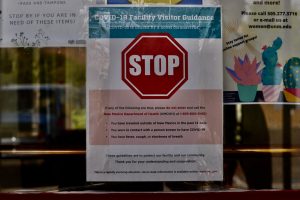By Madison Spratto / New Mexico News Port
The University of New Mexico is helping students who need mental health support during the COVID-19 pandemic by offering a variety of services online.
During times of loneliness and stress, mental health can take a hit, including for UNM students whose college experience has been transitioned to online.
Catherine Stringam, a junior at UNM studying strategic communications, said her life has only gotten busier transferring all of her work online. She’s the director of communications and public relations for Spirit Xpress West, managing their social media and website.
With all of her work being online, plus a full course schedule, Stringam says she has grown more stressed.
“I’m constantly feeling overwhelmed and like I’m scrambling to catch up,” she said. “The increased stress and lack of human interaction has really taken a toll on my mental health, and I’ve found myself sinking into depression.”
She said being around people when feeling like this would normally help her cope. During this time she said she has turned to her faith, which helps.
“I’ve been trying to take whatever free time I have right now to better myself,” Stringam said. “I’m trying to read and learn more, write and blog more, exercise more, and do more of the things that makes me happy.”
Her church, like many others, have also made the shift to online. Through an internship there, she works with high school students and assists in video production. RIght now, her responsibilities have shifted to making Youtube videos and hosting small groups over Zoom.
Austin Anderson, who goes by the nickname Austy Quinn, is a UNM junior majoring in interdisciplinary arts. Like many others, he has felt the impact of COVID-19 hard. Due to the dorm closures, Quinn made the trek back to rural Colorado to live with his grandparents.
“The virus really threw a wrench into my life—firstly, I can’t perform at any local places, since they’re all closed,” he said. “I can’t work on my music or my drag because of the more conservative area I’m stuck in.”
Quinn said he misses his friends the most, adding they serve as a cornerstone for everything he does.
“I can’t get through my life quite the same way without them around,” he said.
While UNM’s traditional resources for mental health look different than they did before, they still are in operation and officials are encouraging people to reach out.
The Women’s Resource Center transitioned to virtual “walk-in” hours and scheduled appointments. They also hold 30 minute advocacy check-ins, resource navigation sessions, and free counseling teletherapy, which can be scheduled by emailing wrcservices1982@unm.edu.

An email from the center’s spokesperson said the center is encouraging students to practice self-care and reach out for help if need be. Some self-care practices recommended include making a clean space, taking time to accomplish a certain task and keep up with a regular medication schedule.
“We want students to know they are not alone, and that we are still here to support them, even if we can’t be there in-person,” the email said.
The UNM Student Health and Counseling also has transitioned to online platforms to provide services. While in-person health appointments are still available, they will be done through telehealth when possible. Their counseling appointments have also transitioned to online through Zoom.
SHAC’s website links to TAO Self-Help, which is an online tool to help people manage their stress and mental health without the use of a counselor.
The state of New Mexico has also come out with a resource for people struggling with their mental health. The recently released phone app NMConnect provides free 24-hour support, crisis or non-crisis.
There also are options to text or talk via phone with health professionals to provide an ear, or referrals to longer term support. The app is linked to New Mexico Crisis Access Line (NMCAL), which is still available via phone 24/7.

Even with resources readily available, people are still grappling with the side effects of the new social rules, including loneliness.
Culture and Clichés correspondent for The Correspondent, Lynn Berger, writes about the effects of social distancing on mental health in her piece “Who’s Afraid Of Loneliness.”
Feeling lonely is not a new phenomena, but it is heightened during this time when people are instructed to be socially distant and isolated. Berger writes chronic loneliness can harm a person’s health.
Lonely people move less and sleep worse, have higher blood pressure and feel more stressed, and are more alert to social threats and negative social cues from others. Studies show that lonely people have weaker immune systems than others.
To combat loneliness, Quinn developed a new hangout routine with his friends over video call, even organizing virtual art sessions.
Stringam has also moved her social interaction online.
“It’s nice to still be able to learn from our pastors and see friendly faces on Zoom, and we’re doing everything we can to make this experience great for people, but it’s just not the same as being together in person, and worshipping together in person,“ she said.
Staying connected is more important than ever, she said. Adding that sending a text to a friend to say things are hard can be a great first step.
“Social distancing doesn’t mean social isolation; depression and anxiety thrive in isolation,” Stringam said. “When you’re able to talk about your mental health with other people, I think it takes a lot of weight off and helps you to breathe again.”
Without the usual resources, Quinn has been getting through the tough change by drawing and songwriting. He said an advantage to his quarantine has been discovering a love for digital drawing.
Quinn’s advice to others is to try something new, even if you don’t think you’d be good at it.
“You may have an undiscovered gift for poetry, or makeup, or sewing,” he said. “And if you’re not good at it, no one’s around to judge you.”
Madison Spratto is a reporter for the New Mexico News Port. She can be contacted on Twitter @Madi_Spratto or at newmexiconewsport@gmail.com.